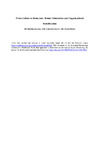Identificador persistente para citar o vincular este elemento:
https://accedacris.ulpgc.es/jspui/handle/10553/74901
| Título: | From culture to behaviour: donor orientation and organisational identification | Autores/as: | Martín Santana, Josefa Delia Cabrera Suárez, María Katiuska Déniz Déniz, María De La Cruz |
Clasificación UNESCO: | 531202 Servicios comunitarios, sociales e individuales | Palabras clave: | Blood Donation Donor Orientation Non-Profit Marketing Organisational Identification |
Fecha de publicación: | 2020 | Proyectos: | la Orientación de Los Centros de Transfusión de Sangre Españoles Hacia Sus Principales Stakeholders Desde Una Perspectiva de Capital Social y Su Influencia en la Perfomance | Conjunto de datos relacionados: | https://accedacris.ulpgc.es/handle/10553/134947 | Publicación seriada: | Journal of Social Marketing | Resumen: | Purpose: This study aims to evaluate whether cultural market orientation (MO) of blood transfusion centres and services (BTCS) results in behaviours aimed at offering a suitable service-experience to blood donors and if the relationship between cultural and behavioural MO is partially mediated by BTCS staff members’ organisational identification (OI). Also, it analyses whether certain employee characteristics, particularly their status of medical or non-medical staff, may affect their perceptions about MO (cultural and behavioural), OI and the relationship between these variables. Design/methodology/approach: An online survey was conducted with senior management staff and chiefs of Spanish BTCS, as well as blood collection staff – physicians, nurses and promoters – (147 participants). Findings: Spanish BTCS has a strong belief in the importance of donors as key stakeholders in the donation system, although cultural MO does not turn into behaviours with the same strength. The results also show that there is a direct effect between cultural and behavioural MO, as well as a mediator effect of OI in this relationship. Research limitations/implications: This study demonstrates that OI is a relevant internal marketing construct with a high potential explanatory power of customer orientation. Practical implications: This study offers a validated tool to assess and monitor BTCS’ donor orientation and recommends that BTCS’ design effective marketing intelligence systems. Social implications: This research contributes to social welfare by helping to explain how the organisational culture of BTCS and their employees’ perceptions and behaviours might help to enhance donor orientation, which would guarantee continual blood collection. This might be useful in the context of negative evolution of blood donation levels in many countries. Originality/value: This research puts the focus on the role of the BTCS’s employees to understand the process by which a donor orientation culture would translate into market-oriented behaviours aimed to reach blood donor satisfaction, to guarantee a constant, growing blood donor pool. In this translation process, the organisational climate seems to play a fundamental role through one of its main variables, i.e. organisational identification. | URI: | https://accedacris.ulpgc.es/handle/10553/74901 | ISSN: | 2042-6763 | DOI: | 10.1108/JSOCM-06-2019-0083 | Fuente: | Journal of Social Marketing [ISSN 2042-6763], v. 10(4), p. 397-425 |
| Colección: | Artículos |
Citas SCOPUSTM
3
actualizado el 08-jun-2025
Citas de WEB OF SCIENCETM
Citations
3
actualizado el 15-feb-2026
Visitas
100
actualizado el 10-ene-2026
Google ScholarTM
Verifica
Altmetric
Comparte
Exporta metadatos
Los elementos en ULPGC accedaCRIS están protegidos por derechos de autor con todos los derechos reservados, a menos que se indique lo contrario.
